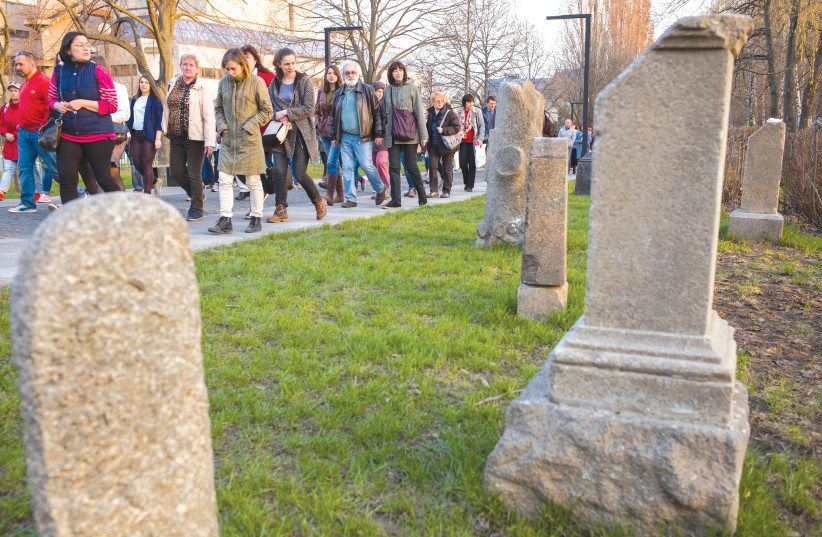Prime Minister Naftali Bennett and Ukrainian President Volodymyr Zelensky spoke by phone on Wednesday, as the latter appealed directly to Israeli public opinion to help his country.
Zelensky tweeted that the two discussed “Russian aggression.”
Bennett’s spokesman says that they spoke “continuing their conversation from last Friday, in which they agreed to keep in contact.”
Read more on the Russia-Ukraine War:
Two hours later, Bennett called Russian President Vladimir Putin, just as Israel voted in the UN General Assembly to condemn Russia for invading Ukraine.
“Putin told Bennett that the central condition for settling the dispute is to take Russia’s vital security interests into consideration,” the Kremlin stated.

The Prime Minister’s Office confirmed the call took place but did not release any details.
Ukraine has asked Israel to send protective gear and weapons, in addition to the 100 tons of humanitarian aid it sent this week. Ukraine’s Ambassador to Israel Yevgen Korniychuk said that Europe is out of helmets and ceramic vests and that Ukraine specifically requested those from Israel, and asked for Israeli field hospitals to be set up in his country.
The call came soon after Zelensky released a statement in Hebrew calling for Jews of the world to speak out against the attacks on Ukraine.
The statement was a translation of part of Zelensky’s daily video, in which he cited Jewish sites struck by Russia in its assault on Ukraine. Releasing it in Hebrew is likely an attempt to appeal to Israeli public opinion; Korniychuk said earlier this week that he hoped that he hoped the Israeli public’s support for Ukraine would influence the government.
“I am now addressing the Jews of the world: Don’t you see what is happening?” Zelensky asked. “That is why it is very important that millions of Jews around the world do not remain silent now.”
“Nazism is born in silence,” he warned, “so shout about the killing of civilians, of Ukrainians.”
In Wednesday’s installment of the daily videos Zelensky has been posting online, the president warned that Russia is trying to erase the history of Ukraine, and of its Jews specifically, following the bombing of the Babyn Yar memorial at the site of the Nazis’ largest massacre of Jews.
“The world promises ‘never again,’” Zelensky said. “Babyn Yar is a special part of Kyiv, a special part of Europe. A place of prayer, a place of remembrance for 100,000 people killed by the Nazis. Who would make it a target for missiles? You are killing Holocaust victims for the second time.”
Zelensky pointed out that the Soviets built a TV tower and a sports complex over Babyn Yar, among other steps taken to hide the fact that Soviet Jews were victims of the Holocaust.
“But why was it bombed? This is beyond humanity,” he said.
Zelensky also mentioned that, on the first day of the war, Uman, the pilgrimage site for Breslov hassidim and tens of thousands of other Jews each year, was “brutally bombed.”
Pushing back at Russian claims that Ukraine is their country’s birthplace and therefore actually part of Russia, Zelensky said the strike on Babyn Yar “shows that for many people in Russia, our Kyiv is completely foreign. They know nothing about our capital, about our history. But they have an order to erase our history, erase our country, erase us all.”
Russian missiles and shells struck the site of Babyn Yar during Moscow’s assault on Kyiv on Tuesday.
On September 29-30, 1941, 33,771 Jews were systematically shot dead and buried in a ravine at Babyn Yar (Babi Yar in Russian).
As many as 150,000 people – Ukrainians, Roma, Soviets and the physically and mentally disabled – were murdered there by the Nazis over a longer period, making the city Europe’s largest mass grave.
President Isaac Herzog spoke out against the attack on Babyn Yar, saying it “epitomizes the terrible tragedy that we are witnessing unfolding in front of our eyes. We express great pain and suffering over what is happening there.”
Herzog noted that he attended the memorial’s opening ceremony with Zelensky, on the 80th anniversary of the massacre.
“The Israeli government reaffirmed its support for Ukraine’s territorial integrity and joined the international community in supporting the resolution at the United Nations General Assembly,” Herzog said during a visit to Cyprus. “Israel is working to advance a diplomatic solution in Ukraine and has offered its services in this regard. We are also sending an unprecedented amount of humanitarian aid: 100 tons. We see this as a moral obligation.”
Foreign Minister Yair Lapid spoke out against the attack but, like Herzog, did not mention Russia.
“We condemn the strike on the Jewish cemetery next to the memorial for the Holocaust of the Jews in Kyiv and the Jewish people in Babyn Yar,” Lapid said.
“We call to respect the site.... We continue to monitor the events and express our sorrow at the loss of human life.”
Lapid instructed Ambassador to Ukraine Michael Brodsky to offer Israel’s help with repairs to the site.
Natan Sharansky, former head of the Jewish Agency and current chairman of the Babyn Yar Holocaust Memorial Advisory Board, slammed the attack and Russian President Vladimir Putin.
“Putin seeking to distort and manipulate the Holocaust to justify an illegal invasion of a sovereign democratic country is utterly abhorrent,” Sharansky stated. “It is symbolic that he starts attacking Kyiv by bombing the site of the Babyn Yar, the biggest of Nazi massacres.”
Sharansky, born in Donetsk, said that the memorial is meant “to preserve historical memory following decades of Soviet suppression of historical truth, so that the evils of the past can never be repeated. We must not allow the truth to – once again – become the victim of war.”
